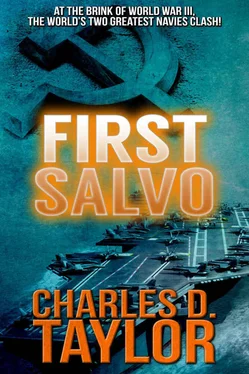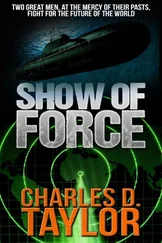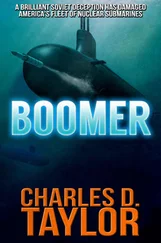A man in the bow jumped gracefully out to hold the boat for them. It was then that Keradin heard Cobb speak another language for the first time.
“English,” the general growled.
“No,” Cobb responded quietly. “American, courtesy of the U.S. Navy,” he added, pointing at the small craft. “Get in.”
Lassiter perched on a stool in the hydrofoil’s wheelhouse moments later as the larger craft slipped out to sea. He pointed at Keradin. “Is that guy in the shorts really him?”
“He sure is,” Cobb answered.
“Doesn’t look like a general to me.” Lassiter got up and circled their prize. Keradin, who affected a haughty air, refused to acknowledge the other. They had just boarded a Soviet hydrofoil, and as they had come alongside, Keradin had the faint hope that perhaps a mistake had been made — until he heard someone hail Cobb in English. To his knowledge, no one in Moscow was aware the Americans had commandeered a Soviet boat.
“And the lovely lady, Cobb — who is the lovely lady?” Verra was still wearing the dress she’d worn to Keradin’s dacha that evening. In Russian, he remarked, “Cobb has done some pretty strange things since I’ve known him, but he never found someone like you before. I expect you’ll be wanting to change into something a little more in keeping with our trip. I’ll have one of my men take you below and see if they can fit you out.”
She still had an eye on Keradin. “I hate to let him out of my sight.”
“Well, ma’am,” Lassiter continued, “I don’t think you have to worry about him at all. You see, even though we still seem to be in the Black Sea, he’s just got himself into American custody. The only Russian you’re going to find around this boat is the general himself. Everyone else is as American as you can get — just like your friend Cobb here.” Lassiter talked like a boy just off the farm. His accent and demeanor were easygoing, as if he were welcoming someone to the country fair. “You leave him up to me and I promise you that nothing good’s going to happen to him. A couple of my boys will hog-tie him for you, just to be sure.”
When Keradin and Verra had gone, Lassiter’s expression changed. “Cobb, my boy, I hate to be the one to tell you this, but the best-laid plans of mice and men…”
“We’re not crossing,” Cobb interrupted.
“Nothing to cross to. That lovely little Turkish village you landed in when you flew up from Saratoga is no more. No landing field, no town, not even a dock to tie up to. All gone, blown into tomorrow. I don’t think they were onto you specifically. Otherwise, your friend the general might have been a little better informed about us. But I think their satellites gave them the message that American aircraft were landing there. What better reason to blow it up?”
“Okay.” Cobb pulled up a stool in front of the chart desk. “Where do we go from here?”
Lassiter pointed at the chart. His finger settled on the western end of the Black Sea. “New orders came through from Sara — from Pratt, I suppose. We’re going to have to make it back by boat. They figure the Russians have airspace control all the way to the Turkish straits and they don’t want to lose your general. I’m hoping to refuel at Istanbul.” He clapped Cobb on the shoulder. “Then you’re in for the ride of your life. NATO really would like to have Keradin in one piece.”
Pratt postured with a rash of plain language messages directed to the Pentagon to convey his optimism, knowing Moscow would intercept them. Battle group preparation was at a pinnacle. French and Italian naval units were making a magnificent contribution, beyond anything Pratt had expected. Soviet Backfire bombers, testing the readiness of the Americans, had been led by the hand and then shocked at their own inability to either surprise or penetrate the early-warning screen. Totally original antisubmarine tactics had baffled Russian attack submarines lurking in the Gulf of Sidra. And his final message revealed that his man had apparently been successful in removing the head of the Soviet Strategic Rocket Forces alive, though he was not yet in American custody.
The picture in Washington, however, was not so rosy, with the United States and much of NATO presented with an entirely different set of circumstances. KGB disinformation had progressed beyond the USSR’s wildest dreams. The Japanese government, after the resignation of the Premier, demanded the departure of the U.S. Seventh Fleet; they claimed it was making a target out of their country. Terrorist activities in the major cities of NATO member countries had succeeded in frightening the general populace, if not their leadership. Industry and business had ceased to function. Transportation was at a standstill. Citizens feared to leave their homes after the threats of assassination and bombing became a reality. As reserve forces were activated and U.S. Military Police appeared in the streets to reinforce local police and militia, newspapers and left-wing organizations called for a halt to war preparations. Evacuation of U.S. dependents further heightened the crisis as the European media hinted darkly that the American intent was to make Central Europe the only battlefield.
Washington needed proof that General Keradin was actually in American hands. Soviet television had already countered with television photos of Keradin that morning attending a meeting of the STAVKA, the Main Military Council, and there was no way to prove that the pictures had not been taken previously. At the same time, Moscow announced that their Strategic Rocket Forces were prepared to launch missiles on both NATO countries and the North American continent at the least provocation, with satellite photos and intercepted radio messages from the Soviet Union confirming their state of readiness. The only option for Washington was to counter, bringing the American triad — ICBMs, Trident submarines, and nuclear bombers — to an equivalent state. Only if General Keradin could be delivered into American hands at the appropriate moment and displayed to the world did U.S. leaders feel that the strategic nuclear forces of both countries could stand down. It was absolutely critical that both sides limit the confrontation to conventional weapons.
In the North Atlantic, American naval convoys plowed on toward Europe, surrounded by antisubmarine forces and preceded by specially trained packs of hunter-killer subs. There was still no firm indication whether or not they would be intercepted. First-light photographs of the Svalbard region through partial clouds revealed damage to the Longyearbyen airfield and the Soviet bombers that had been there at the time; but there had been no further communications from the SEAL team, and no final confirmation of how many of the Soviet decoys had been destroyed. Even then, some may already have been delivered along the GIUK gap to counter the American CAPTOR defense line. More Soviet bombers were in the air on the way to Svalbard. If those decoys still existed, and if those bombers could get them to the GIUK gap, there was a good chance the Soviet subs could get through to the U.S. convoys.
Only the political and military leaders of the Soviet Union, NATO, and the U.S. knew how critical the situation was. Actions over the next twenty-four to forty-eight hours would determine the fate of Europe and whether there would be a nuclear barrage. The citizens of those countries knew nothing but the terror that comes of not knowing.
ABOARD U.S.S. JOHN F. KENNEDY , SOUTHEAST OF MALTA
Admiral Pratt tentatively picked up the stub of his cigar from his favorite ashtray, with its solid-brass base made of an old five-inch shell, a going-away present from the chief petty officers on his first destroyer. That ashtray traveled the world with Pratt, and today on the eighty-thousand-ton carrier, it remained his pride and joy. Perhaps , he often thought to himself, it’s a symbol of the old and the new, the guns-and-guts Navy versus the microchip Navy. The guns have become missile launchers, the guts have become brains — but it still takes a human being to manage either one .
Читать дальше












